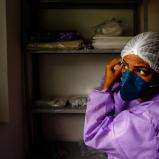Over the past year, Doctors Without Borders/Médecins Sans Frontières (MSF) has responded to the unprecedented threats posed by COVID-19 across all our projects. We also see how the pandemic can compound existing problems, trigger new crises, and overshadow other humanitarian needs.
For this special edition of Alert, we highlight some of the world's forgotten emergencies—forgotten by many in the international community but certainly not by our teams on the ground. In this photo essay, we bear witness to suffering, survival, and extraordinary strength during a tumultuous year.
Limited COVID-19 testing by Brazil’s government has made both tracking and responding to the pandemic’s spread across this vast country extraordinarily difficult. When a Doctors Without Borders/Médecins Sans Frontières (MSF) team reached Manaus, the capital city of Amazonas state, in April, there were already signs of crisis everywhere. “When I arrived in Manaus, the grave diggers were working beyond capacity,” recalled Antonio Flores, medical coordinator for the MSF team. “All the hospital intensive care units (ICUs) were overflowing with dying patients, and there were lists with hundreds of severely sick people waiting in health centers for an intensive care hospital bed to become free. It was worse than we had feared.”
The team got an ICU ward up and running right away, and then began activities to reach the most vulnerable and at risk groups. We were particularly concerned about the safety of the indigenous Warao people, thousands of whom have fled economic and political upheaval in Venezuela in recent years to seek shelter in Brazil. MSF set up a special isolation center for Warao people who showed symptoms of COVID-19.

Vitória Ramos, who works with MSF as a humanitarian affairs and advocacy officer based in Manaus, highlighted the importance of engaging with members of the community at every stage. “You have different cultures within the Warao community, so it’s very important to work closely with them and with their leaders to see what’s the best way. And to build from bottom up,” she said. The center included hammocks, tailored to meet the community’s needs but spaced apart for social distancing. The team reached out to Warao leaders, who approved the center and conducted a ceremony to protect the space.
“This kind of bottom-up approach is very important,” Ramos said. “And sometimes during an emergency, in the humanitarian world, we can forget that very easily because we’re just running around and want to get things done.” She said close consultation with the community is not only more respectful but also more efficient in the end.

Some 575 miles upriver from Manaus is São Gabriel da Cachoeira, a city in Amazonas state where more than 90 percent of the residents are of indigenous origin. MSF met with leaders and organizations linked to the indigenous communities. Our staff participated in radio programs to respond to questions coming from remote areas.

MSF set up a care center here to receive patients suffering from mild and moderate cases of COVID-19, and made sure the facility was specifically adapted to suit local traditions. Indigenous patients with COVID-19 could stay with a caregiver on hand for the duration of treatment, something that is not usually allowed in hospitals. Hammocks were available for patients and companions. Traditional medicines used by many people in the region were accepted at the center and could be taken together with treatments offered by MSF, as long as their combination did not cause any adverse effects. Shamans, spiritual leaders of indigenous communities, were also able to visit and perform rituals— as long as they used personal protective equipment.
Vilmar da Silva Matos is a Yanomami indigenous leader who occasionally travels from his community, Maturacá, to São Gabriel da Cachoeira. “We thought we were lost. We were especially concerned with the elderly,” he said. “We were afraid of losing our leaders—who are like our dictionaries, our storytellers.”

Teams also worked to prevent, diagnose, and treat COVID-19 in the western state of Mato Grosso do Sul. In addition, MSF provided support to medical staff from the local health agencies. There is a high prevalence of chronic diseases among the indigenous communities here, putting them at greater risk of serious complications and death from COVID-19.
“When it arrived, it arrived in full force,” said Alcery Marques Gabriel, a local indigenous leader of the Terena people, recalling the start of the coronavirus outbreak. “We lost elders who carried our history. Now what?” Oto Lara, a community leader from the village of Colonia Nova, in the indigenous land of Taunay/Ypegue, said the pandemic “has left a trail of destruction.”
When MSF responded to an acute peak of COVID-19 in the northern state of Roraima, our team reconnected with Jacir de Souza, a Macuxi leader who first encountered MSF nearly 30 years ago, during a major malaria epidemic. Many of the people MSF trained in the area in the early 1990s as indigenous health workers continue to serve their communities to this day. “There was malaria throughout the state, and then [with the work] it was gone,” recalls de Souza, who is now 72. “It was really over.
De Souza is now deeply concerned about the impact of COVID-19. Although he received treatment and recovered at the MSF-supported field hospital in the state capital, Boa Vista, many others who were close to him did not survive. “I did not expect it would be such a tough disease,” he says. “I lost my younger brother, I lost my mother-in-law, I lost my aunt. I don’t know when this disease will go away.”
Protecting indigenous communities from the ravages of COVID-19 is essential, in order to save lives and to preserve the irreplaceable knowledge of generations.






